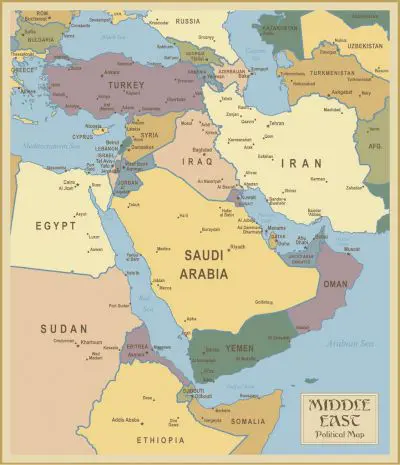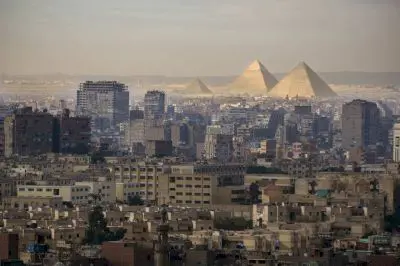Egypt's Market Overview
Egypt is one of the northeastern countries of Africa. It borders Libya to the west and Sudan to the south. Egypt's GDP is estimated at more than 32% in the agricultural sector. Egypt produces 688,100 barrels of oil per day. Egypt's economic situation grew by 0.26% in 2020. Egypt ranks very high in the welfare services sector in the city, transportation and urbanization system. Suez is unique in Egypt for investment, the city is divided into economic and commercial sectors and is on the list of best cities for investment. The rate of social security in Egypt is estimated at 40.00 percent, although this rate has been stable from previous years until today.
Tourism, agriculture, industry, and services sectors each account for almost equally in the country's domestic production. Political situation in Egypt is under control and the financial corruption within the companies has been minimized.
Geography and politics of Egypt

Egypt is one of the northeastern countries of Africa. It borders Libya to the west and Sudan to the south. Egypt is bordered by the Mediterranean Sea to the north, Israel by land on the Sinai Peninsula, and Palestine on the Gaza Strip. The north of Egypt generally has a pleasant climate due to its proximity to the Mediterranean Sea. The north of Egypt generally has a pleasant climate due to its proximity to the Mediterranean Sea. The eastern and western deserts and the warm weather seen in this country have certain classifications. Cold winters are sometimes seen up to 25 degrees below zero in all parts of Egypt.
The social security rate in Egypt is also estimated at 40.00 percent, although this rate has been stable from previous years until today. The strange traditions and superstitions that are seen among the people in Egypt are increasing day by day and are part of their culture. Most people follow the culture of living in Egypt ethnically, and when the great person of a nation considers what the conditions are in the culture of Egypt, the people must be able to take these principles seriously.
Geography and politics of Egypt, Read More ...
Add your import and export orders to this list
Warning: Undefined variable $formTitle in /home/anbar/domains/anbar.asia/anbar/inc/html/desktop/orderform.php on line 10
Warning: Undefined variable $marketName in /home/anbar/domains/anbar.asia/anbar/inc/html/desktop/orderform.php on line 12
Warning: Undefined variable $location in /home/anbar/domains/anbar.asia/anbar/inc/html/desktop/orderform.php on line 12
If you want to trade in the , please join in Anbar Asia. Your order will be shown here, so the traders of contact you

Egyptian economy and financial resources and income

Agriculture has traditionally played a significant role in Egypt's economy. The country benefits from the fertile soil of the Nile River, allowing for the cultivation of a variety of crops such as cotton, wheat, corn, sugarcane, and fruits. Agriculture contributes to both domestic consumption and exports, providing employment opportunities for a significant portion of the population. The Suez Canal is a vital source of income for Egypt. It is an artificial waterway connecting the Mediterranean Sea to the Red Sea, allowing for shorter trade routes between Europe and Asia. The canal generates substantial revenue through tolls and fees paid by ships passing through, making it a crucial contributor to Egypt's economy.
Egypt is a significant producer and exporter of oil and natural gas in the region. The country has both onshore and offshore oil and gas fields, with major reserves located in the Nile Delta and the Mediterranean Sea. Revenue from the extraction and export of oil and gas resources contributes significantly to Egypt's income and foreign exchange earnings. Egypt's rich historical and cultural heritage, including iconic landmarks such as the Pyramids of Giza, the Sphinx, and ancient temples, attracts millions of tourists each year. Tourism is a vital sector for the Egyptian economy, providing employment opportunities and generating foreign currency through visitor expenditures.
Egyptian economy and financial resources and income, Read More ...
![]() Egypt Natural Stones Market
Egypt Natural Stones Market![]() Egypt Minerals Market
Egypt Minerals Market![]() Egypt Petroleum Market
Egypt Petroleum Market![]() Egypt Gemstones Market
Egypt Gemstones Market![]() Egypt Construction Materials Market
Egypt Construction Materials Market![]() Egypt Chemicals Market
Egypt Chemicals Market![]() Egypt Metals Market
Egypt Metals Market![]() Egypt Petrochemicals Market
Egypt Petrochemicals Market![]() Egypt Real estates Market
Egypt Real estates Market![]() Egypt Food Market
Egypt Food Market![]() Egypt Crops Market
Egypt Crops Market![]() Egypt art and craft Market
Egypt art and craft Market
The type of government and political structure of Egypt

The country has a gross domestic product of $ 332.90 billion. About 28 million people are working in this country, and of course, the participation rate has increased. Estimates show that Egypt's GDP is estimated at more than 32% in the agricultural sector. Egypt produces 688,100 barrels of oil per day. The country as a whole has a lot of gas resources and 76.40 billion cubic meters of gas is produced during the year. Exports in Egypt mostly include crude oil and petrochemical products, and of course cotton, textiles and hardware are also exported from this country to other countries.
In Egypt, the prime minister is the head of state and is appointed by the president. The prime minister's cabinet is also elected by the president. The People's Council in this country is called Majlis al-Shabi, which has 454 seats, of which 444 are elected by popular vote and ten are elected by the president. The term of office for the People's Assembly in Egypt has been announced for 5 years. In Egypt, there is an advisory council known as Al-Shura. The parliament has 264 members, of whom 174 are elected by popular vote and 88 are elected by the president. In general, there are many political movements in Egypt, each with its conditions.
The type of government and political structure of Egypt, Read More ...
Global ranking in all areas of Egypt

Egypt is considered a regional economic powerhouse in the Middle East and North Africa (MENA) region. With its large population, strategic location, and diverse economy, Egypt plays a crucial role in shaping regional economic dynamics. Egypt's financial sector is well-developed and serves as a regional hub for banking and financial services. Cairo, the capital city, hosts the headquarters of major banks, insurance companies, and financial institutions. The Egyptian Exchange (EGX) is the country's main stock exchange, attracting domestic and international investors.
Egypt has undertaken significant economic reforms to address structural challenges and create a business-friendly environment. These reforms include measures to enhance fiscal stability, streamline bureaucracy, improve infrastructure, and attract investment. The International Monetary Fund (IMF) has supported Egypt's reform efforts through financial assistance programs. Egypt's historical and cultural treasures make it a popular tourist destination. The tourism sector contributes to the country's global recognition and attracts visitors from around the world. Egypt's tourism industry plays a vital role in generating foreign exchange earnings and supporting employment.
Global ranking in all areas of Egypt, Read More ...
The capital and major cities of Egypt

Egypt's capital city is Cairo, located in the northeastern part of the country. Cairo is not only the political capital but also the economic and cultural hub of Egypt. It is one of the largest cities in Africa and the Middle East, with a population of over 20 million people in the metropolitan area. Cairo is known for its rich history, ancient landmarks, and bustling city life. It is home to iconic attractions such as the Great Pyramids of Giza, the Sphinx, and the Egyptian Museum, which houses an extensive collection of ancient artifacts, including the treasures of Tutankhamun. The city also has modern infrastructure, including skyscrapers, shopping malls, and a vibrant nightlife.
Aswan is a city located in the southern part of Egypt, near the border with Sudan. It is famous for its location along the Nile River and the Aswan High Dam, which has had a significant impact on Egypt's agriculture and energy production. Aswan is also known for its beautiful Nubian villages, temples such as Philae Temple, and the unfinished Obelisk. These cities, along with others such as Hurghada, Dahab, and Port Said, contribute to Egypt's vibrant urban landscape, tourism industry, and economic activities. Each city has its unique attractions, history, and cultural offerings, making Egypt a diverse and captivating destination for visitors.
The capital and major cities of Egypt, Read More ...
Population and companies in Egypt

The population of Egypt, which is over 100 million people, provides a significant labor force for companies operating in the country. The large population offers a pool of potential employees with diverse skill sets and expertise across various sectors. Companies rely on this labor force to fill positions and drive their operations. The sizeable population of Egypt also serves as a significant consumer base for companies. With a large domestic market, companies have the opportunity to target and sell their products or services to a substantial number of potential customers. This population provides a demand for various goods and services, driving economic activity.
The presence of companies and their operations in Egypt contributes to the country's overall economic growth. Companies generate revenue, pay taxes, and contribute to the gross domestic product (GDP) of the country. Their activities stimulate economic activity, investment, and productivity, which in turn can lead to improved living standards for the population. Companies in Egypt often invest in the training and development of their employees. This helps enhance the skills and capabilities of the workforce, improving their employability and potential for career advancement. The population benefits from the acquisition of new skills, which can have long-term positive effects on individuals and the overall economy.
population and companies in Egypt, Read More ...
Exports to Egypt and the importance of trade with Egypt

Egypt for many reasons, including its large Muslim population, rich natural resources, large industrial factories, abundant foreign exchange earnings from the tourism industry, extensive commercial facilities, geographical location,
The combination of these facilities and capabilities can pave the way for economic cooperation and the expansion of the country's trade relations with Iran, but there is a deep gap between Iran's potential and realized trade capacities with Egypt.
Exports to Egypt and the importance of trade with Egypt, Read More ...
The culture and laws of the Egyptian people

Egypt's ancient civilization has had a profound impact on its culture. The country is renowned for its majestic pyramids, temples, and archaeological sites, which reflect the achievements and beliefs of ancient Egyptians. The culture celebrates its pharaonic past and preserves its traditions through festivals, museums, and historical sites. The official language of Egypt is Arabic. Egyptian Arabic, a dialect spoken in the country, has its unique characteristics. English and French are also commonly understood and spoken, particularly in urban areas and among professionals in the tourism industry.
The majority of Egyptians are adherents of Islam, with Sunni Muslims comprising the largest religious group. Islamic traditions and practices influence many aspects of daily life, including religious observances, festivals, and social customs. There is also a significant Christian minority, primarily belonging to the Coptic Orthodox Church. Family plays a central role in Egyptian society, with strong family ties and close-knit communities. Respect for elders and the importance of kinship are highly valued. Traditional gender roles are still prevalent, with men typically being the primary breadwinners and women taking on domestic responsibilities.
The culture and laws of the Egyptian people, Read More ...

















